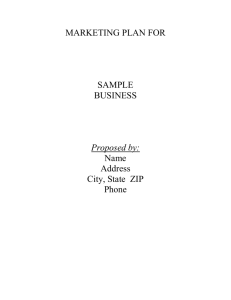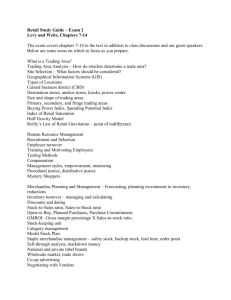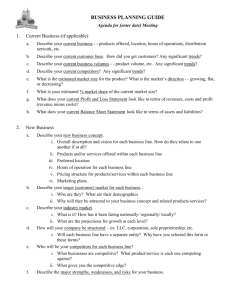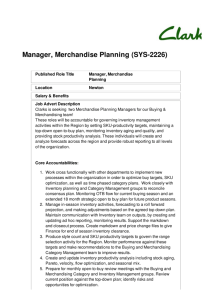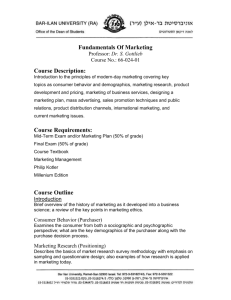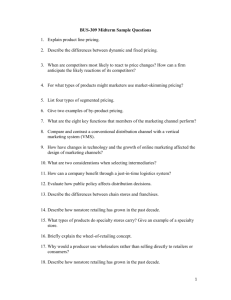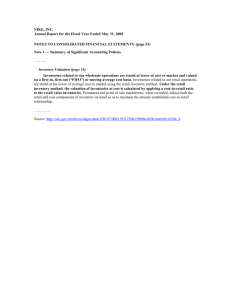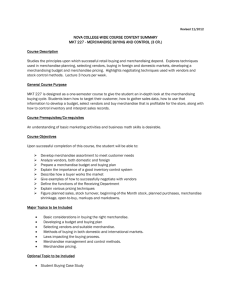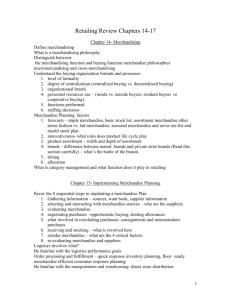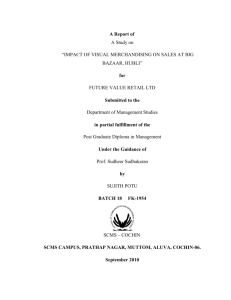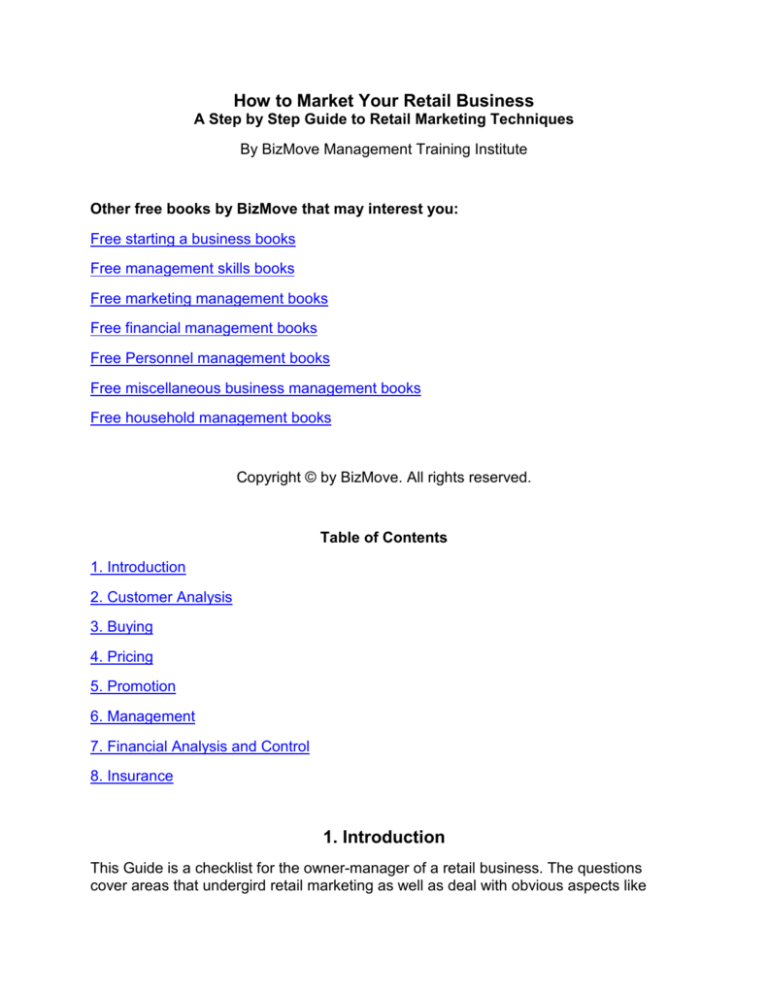
How to Market Your Retail Business
A Step by Step Guide to Retail Marketing Techniques
By BizMove Management Training Institute
Other free books by BizMove that may interest you:
Free starting a business books
Free management skills books
Free marketing management books
Free financial management books
Free Personnel management books
Free miscellaneous business management books
Free household management books
Copyright © by BizMove. All rights reserved.
Table of Contents
1. Introduction
2. Customer Analysis
3. Buying
4. Pricing
5. Promotion
6. Management
7. Financial Analysis and Control
8. Insurance
1. Introduction
This Guide is a checklist for the owner-manager of a retail business. The questions
cover areas that undergird retail marketing as well as deal with obvious aspects like
customer analysis, buying, pricing, and promotion. You can use it to evaluate your
current status and, perhaps, to rethink certain decisions.
If your retail firm is to be successful over the long run, it must satisfy the needs and
desires of its present and potential Customers. Sound Buying means knowing where to
buy, what to buy, how much to buy, and how to place an order. This requires familiarity
with old and new products, adequate and working with suppliers in ways that benefit the
store. In Pricing, you need to understand the market forces affecting your business, plan
the price policies that you will follow, and know whether or not your pricing policies meet
State and Federal regulations.
You need to be familiar with various types of Promotion and when, where, and how to
use them. In addition, a credit program or other special customer services can be
attractions.
Under the heading of Management goes the establishment of both long- and shortrange goals. How you set up your organization and how you communicate with your
employees are crucial factors in the accomplishment of your goals. Of equal importance
to good management is the ability to keep and make use of accurate Financial Records.
It also pays to examine your Insurance coverage in various areas.
In answering the following questions, you will be reminded of what you may still need to
do to round out all marketing aspects of your business.
Go to Top
2. Customer Analysis
Who are your target customers and what are they seeking from you?
Have you estimated the total market you share with competition?
Should you try to appeal to this entire market rather than a segment(s)?
If you concentrate on a segment, is it large enough to be profitable?
Have you looked into possible changes taking place among your target customers
which could significantly affect your business?
Can you forsee changes in the makeup of your store's neighborhood?
Are incomes in the community apt to be stable?
Is the community's population subject to fluctuation?
Do you stress a special area of appeal, such as lower prices, better quality, wider
selection, convenient hours?
Do you ask your customers for suggestions on ways to improve your operation?
Do you use "want slips"?
Do you belong to a trade association?
Do you subscribe to important trade publications?
Have you considered using a consumer questionnaire to aid you in determining
customer needs?
Do you visit market shows and conventions to help anticipate customer wants?
Do most of your customers buy on weekends?
Do sales increase in the evening?
Do the majority of your customers prefer buying on credit?
Go to Top
3. Buying
Have you a merchandise budget (planned purchases) for each season?
Does it take into consideration planned sales for the season?
Does it achieve a planned stock turnover?
Have you broken it down by departments or merchandise classifications?
Have you a formal plan for deciding what to buy and from whom?
Have you a system for reviewing new items coming onto the market?
Have you considered using a basic stock list or a model stock plan in your buying?
Are you using some sort of unit control system?
Do you keep track of the success of your buying decisions in previous years to aid you
in next year's buying?
Do you attempt to consolidate your purchases with two or three principal suppliers?
Have you a useful supplier evaluation system for determining their performance?
Have you established a planned gross margin for your firm's operation and are you
buying so as to achieve it?
Go to Top
4. Pricing
Have you established a set of pricing policies?
Have you determined whether to price below, at, or above the market?
Do you set specific markups for each product?
Do you set markups for each product categories?
Do you use a one-price policy rather than bargain with customers?
Do you offer discounts for quality purchases, or to special groups?
Do you set prices to cover full costs on every sale?
Have you developed policy on when to take markdowns and how large?
Do the prices you have established earn planned gross margin?
Do you clearly understand the market forces affecting your pricing methods?
Do you know which products are slow movers and which are fast?
Do you take into consideration when pricing?
Do you know which products are prices sensitive to your customers, that is, when a
slight increase in price will lead to a big dropoff in demand?
Do you know the maximum price customers will pay for certain products?
If the prices on some products are dropped too low, do buyers hesitate?
Is there a specific time of year when your competitors have sales?
Do your customers expect sales at certain times?
Have you determined whether or not a series of sales is better than one clearance sale?
Do you know what role you want price to play in your overall retailing strategy?
Are you influenced by competitor's price changes?
Are there restrictions regarding prices you can charge?
Do any of your suppliers set a minimum standard at which it can be sold?
Does your State have fair trade practice acts which require you to mark up your
merchandise by a minimum percentage?
Are there any State regulations on how long "close-out" sales can be advertised?
Are you sure you know all the regulations affecting your business, such as two-for-one
sales and the like?
Do you issue "rainchecks" to customers when sale items are sold out so they can
purchase later at sale price?
Go to Top
5. Promotion
Are you familiar with the strengths and weaknesses of various promotional methods?
Have you considered how each type might be used for your firm?
Do you know which of your items can be successfully advertised?
Do you know which can be sold best by demonstrations?
Do you know when it is profitable to use institutional advertising?
Do you know when product advertising is better?
Do you know which of the media (radio, television, newspapers, yellow pages,
handbills) can most effectively reach your target group?
Do you know what can and cannot be said in your ads (Truth in Advertising
requirements)?
Can you make use of direct mail?
Is a good mailing list available?
Are your promotional efforts fairly regular?
Do you concentrate them on certain seasons?
Are certain periods of the week better than others?
Is there available financial or technical assistance which you can use to enhance your
promotional efforts?
Can you get help from local newspapers, radio, or television?
Are cooperative advertising funds available from suppliers?
Do you tie your local efforts to your supplier's national program?
Do you join with other merchants in area-wide programs?
Have you looked for ratios to estimate what comparable firms are spending on
promotion?
Do you study the advertising of other successful retail firms, as well as of your
competitors?
Have you some ways of measuring the success of the various promotional programs
you are using?
Are your products displayed to maximize their appeal within the store?
Do you know which of your items have unusual eye appeal and can be effective in
displays?
Have you figured out the best locations in the store for displays?
Are you making use of window displays to attract customers?
If you use multitiered display stands or gondolas, do you know which shelves are the
best sellers?
Have you a schedule for changing various displays?
Do you know which items are bought on "impulse" and therefore should be placed in
high traffic areas?
Where price is important, do you make sure the price cards are easy to read?
Do your suppliers offer financing of accounts receivable, floor planning, and so forth?
Do you know what type of credit program (if any) you should offer?
Does the nature of your operation require some type of credit for your customers?
Have you discussed credit operations with your local credit bureau?
Would a credit program be a good sales tool?
Is a credit program of your own desirable?
Have you looked into other programs of credit cards?
If you set up your own credit program, do you know what standards you should use in
determining which customers can receive credit, for what time periods, and in what
amounts?
Do you know all of the costs involved?
Will the interest you charge pay for these costs?
Do you know about the Fair Credit Reporting Act?
Are you familiar with the Truth-in-Lending legislation?
Have you determined a safe percentage off your business to have on credit program
with your accountant and attorney?
Do you offer some special customer services?
If you offer delivery service, do you own your vehicles?
Have you considered leasing them instead?
Have you thought about using commercial delivery service?
Do you charge for delivery?
If not, do you know how to work the delivery expenses into the selling price of your
products?
Have you a policy for handling merchandise returned by customers?
Have you considered certain obligations to your community, in terms of charitable
contributions, donations for school functions, ads in school yearbooks?
Do you participate in activities of your chamber of commerce, merchants' association,
better business bureau, or other civic organizations?
Go to Top
6. Management
Have you developed a set of plans for the year's operations?
Do your plans provide methods to deal with competition?
Do they contain creative approaches to solving problems?
Are they realistic?
Are they stated in such a way that you know when they have been achieved?
Have you a formal plan for setting aside money to meet any quarterly tax payments?
Are you organized effectively?
Are job descriptions and authority for responsibilities clearly stated?
Does your organizational structure minimize duplication of effort and maximize the use
of each employee's skills?
Do employees understand how they will be rated for promotion and salary increases?
Does your wage schedule meet the local rate for similar work and retain competent
employees?
Would you or some of your employees profit by taking business education courses
offered at local schools?
Will training help your employees achieve better results?
Do your experienced employees help train new and part-time employees?
Have you good working conditions?
Do you use positive personal leadership techniques like being impartial, giving words of
encouragement and congratulations, and listening to complaints?
Are you familiar with the Fair Labor Standards Act as it applies to minimum wages,
overtime payments, and child labor?
Do you avoid all forms of discrimination in your employment practices?
Do you have a formal program for motivating employees?
Have you taken steps to minimize shoplifting and internal theft?
Have you an effective system for communicating with employees?
Are they informed on those plans and results that effect their work?
Do you hold regular meetings that include all personnel?
Do your employees have their own bulletin board for both material you need to post and
items they with to post?
Have the "rules and regulations" been explained to each employee?
Does each employee have a written copy?
Is each employee familiar with other positions and departments?
Do you have an "open door" policy in your office?
Go to Top
7. Financial Analysis and Control
Have you established a useful accounting system?
Do you know the minimum amount of records you need for good control?
Do you know all the records you should keep to aid you in meeting your tax obligations
on time?
Do your Sales records give you the key information you need to make sound decisions?
Can you separate cash sales from charge sales?
Can sales be broken down by department?
Can they be broken down by merchandise classification?
Do they provide a way to assess each salesperson's performance?
Do your Inventory records give you the key information you need to make sound
decisions?
Do they show how much you have invested in merchandise without the necessity of a
physical inventory?
Do you know the difference between inventory valuation at cost and at market?
can you tell which one shows a loss in the period earned?
Can you tell which one conserves cash?
Do you understand the pros and cons of the cost method of inventory accounting versus
the retail method?
Have you found an accounting method that shows the amount of inventory shortages in
a year?
Do your Expense records give you the key information you need to make sound
decisions?
Do you know which expense items you have the greatest control over?
Are the records sufficiently detailed to identify where the money goes?
Can you detect those expenses not necessary to the successful operation of your
business?
Do you effectively use the information on your profit and loss statement and balance
sheet?
Do you analyze monthly financial statements?
can you interpret your financial statements in terms of how you did last year and
whether you met this year's goals?
Do your financial statements compare favorably with other similar businesses in terms
of sales, cost of sales, and expenses?
Are you undercapitalized?
Have you borrowed more than you can easily pay back out of profits?
Can you see ways to improve your profit position by improving your gross margin?
Do you use the information contained in your financial statements to prepare a cash
budget?
Go to Top
8. Insurance
Have you adequate insurance coverage?
Do you have up-to-date fire coverage on both your building equipment and inventory?
Does your liability insurance cover bodily injuries as well as such problems as libel and
slander suits?
Are you familiar with your obligations to employees under both common law and
worker's compensation?
Do you spread your insurance coverage among a number of agents and take the risk of
overlapping coverage or gaps which may raise questions as to which firm is
responsible?
Has your insurance agent shown you how you can cut premiums in areas like fleet
automobile coverage, proper classification of employees under worker's compensation,
cutting back on seasonal inventory insurance?
Have you looked into other insurance coverage, such as business interruption
insurance or criminal insurance?
Do you have some fringe benefit insurance for your employees (group life, group health,
or retirement insurance)?
These questions are meant to help you analyze your retail operation from the marketing
viewpoint. You should know the strengths of your business and products. You must also
know the real problems you are up against. Your business depends on your good sense
and management foresight. You must adapt to new markets, product changes, and be
innovative to keep your business growing.
Go to Top
****

